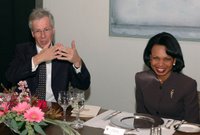A passing mention in Stephen Harper's victory speech Monday night could hold a clue to changes at the board that regulates the province's offshore oil and gas industry.
Harper mentioned allowing Atlantic Canadian provinces more control over their resources. What he meant by this is unclear since these provinces already control their resources. For Nova Scotia and Newfoundland and Labrador there was no specific mention in the Conservative platform of offshore oil and gas resource management.
One section of the
platform, however, does mention the External Advisory Committee on Smart Regulation:
Streamline regulatory processes related to the mining industry. We will implement the recommendations of the External Advisory Committee on Smart Regulation related to mining, such as a "single window" approach to federal regulatory bodies in the North for the oil and gas and mining sectors.
Set up in May 2003 by Prime Minister Jean Chretien, the Smart Regulation advisory committee was a team of experts appointed to review federal regulatory processes, identify areas of concern and recommend new approaches.
Some of the strongest recommendations made by the Smart Regulation group were for greater co-ordination not only within the federal government but also between the federal and provincial governments. [Recommendations 9, 10, 11]
Co-ordinators - single points of contact - were recommended for entire industry sectors such as offshore oil and gas.
In Newfoundland and Labrador, that single point of contact would logically be the Canada-Newfoundland and Labrador Offshore Petroleum Board (CNLOPB). The offshore board is established under the Atlantic Accord (1985) as the joint federal and provincial regulatory authority for the oil and gas industry offshore Newfoundland and Labrador.
Currently, the regulatory process can be daunting in a competitive industrial environment that is global in scope. Industry representatives have pointed to problems for several years. As the Smart regulatory team
reported:
The Committee heard that the current regulatory framework for the offshore falls short of these objectives. For example, according to industry sources, the average regulatory approval time for projects in Canada's Atlantic offshore exceeds 600 days, compared to approximately 200 days in the United Kingdom and Norway and just under 400 days in the Gulf of Mexico.
The Atlantic Energy Roundtable similarly
notes that the regulatory process cycle time, that is the length of time for regulatory review and approvals for offshore projects, is longer in Newfoundland and Labrador than anywhere else globally.
The White Rose project - the most recent to be approved - took 21 months, compared to 10 months for a comparable project in the Gulf of Mexico and a mere 13 months for the much larger Hibernia project. This time does not include the period of negotiation between proponents and the provincial government over royalties and local benefits.
While recognizing that there are overlapping areas of federal and provincial jurisdiction in the offshore, the Smart Regulation group did not suggest any devolution of federal powers to the provinces, nor does the Conservative Party make such a recommendation. Rather, the Smart Regulation team believed that the correct approach would be agreements and memoranda of understanding to eliminate duplication of regulation and administration.
This Conservative commitment may put into a different light the possible appointment of Andy Wells as chairman and chief executive officer. Wells' evident lack of experience in federal and provincial regulatory administration would make him ill-suited to the day-to-day task of overseeing development of a new streamlined approach.
The changed regulatory process would also involve extensive changes to the communications processes, something not currently provided in the legislation governing the board and something Wells himself has never been keen on. As mayor of St. John's for example , Wells has steadfastly refused to employ communications professionals, believing his own blunt - some would say crass - approach is superior to anyone else's skills.
There is some possibility that Wells would be appointed to serve as chairman, a position already identified as a stand-alone appointment requiring the approval of both orders of government. In that scenario, Max Ruelokke, recommended by the three person panel that reported in December, would serve as chief executive officer of the offshore board, again, an arrangement provided in the Atlantic Accord (1985).
While Wells' possible appointment has slipped from public notice for some time, federal interest in changes to the offshore regulatory regime could bring the matter back into focus. It is not clear what position the incoming Harper government will take on its role and responsibilities in regulating offshore industries.
However, it is possible that Wells' appointment, if it occurs, will not be the full-time one he anticipated.







